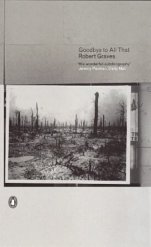
Goodbye to All That
Robert Graves
282 pages
published in 1929, revised 1957
Before Goodbye to All That, the only book of his I had read was I Claudius. The two books are somewhat different from each other: I Claudius a novel about a Roman emperor, Goodbye to All That Robert Grave's autobiography. However, having now read his autobiography, I could see where some of I Claudius came from.
Born in 1895, Robert Graves is of the generation that came of age in the Great War. Like many, his later life was forever marked by his experiences during the war. It is this that I, with hindsight, also saw in I Claudius: a sort of weariness, a feeling of having seen the worst excesses humankind can sink to. You see that in quite a lot of writers that lived through the Great War. Take Tolkien's descriptions of Mordor for example and the horrendous trek Frodo and Sam go through: the same kind of weariness can be found in I Claudius and Goodbye to All That both.
It is difficult now for us to understand the visceral impact the Great War had on that generation. It certainly is for me, if only because my home country, The Netherlands, largely escaped that war, being neutral at the time. Our great trauma is the Second World War, rather than the First. But that is not the whole of it. We live some eighty odd years after the end of the Great War, which horrific as it was, now seems positively mild in comparision with the wars that followed: the Second World War, the Vietnam war, the various civil wars in Africa: a catalogue of horrors none of us is able to stay ignorant about. The result of all this is that even the most optimistic of us has a borderline cynicism inside themselves that this generation lacked. Loath as I am to paint the 19th century as a Golden Age compared to the 20th, for the people of Graves' generation, the ones who grew up safely middle or upper class in a country that had not known war directly for a 100 years at least, the First World War must have been an incredible shock, a shattering of everything they ever believed in.
The echoes of this shock are found all over English literature of the 1920ties and 1930ties and Goodbye to All That is no exception. The way in which Graves has written this autobiography there is a clear narrative, with his life prior to the war as prologue and his life after the war as an epilogue; of the 282 pages in the book, a full 175 are devoted to the war.
The war therefore, left a great impression on Graves, but how could it otherwise? When it broke out, he was barely nineteen years old, just out of school and on the point of going to Oxford: instead he volunteered for the army. In the chapters devoted to his childhood and school going years, we already learned that he was a sensitive boy, a true writer sort of person. I can barely imagine what the war must've been like for him. The interesting thing here is that despite this, he writes so matter of factly about his experiences, with none of the bad dramatics one gets from those writers who did not experience it firsthand (Compare this with Dorothy Sayers' descriptions of Lord Peter's war experiences and keep in mind Virginia Woolf's remarks about how no woman could've written War and Peace; no woman could've have written this either.)
Another way to judge the impact the war had on him, is to think about his experiences after the war, as Graves recounts it here. He never comes out and says it explicitely, but I did get the impression that he was suffering from post-traumatic depression for a long time. The war had interrupted his ordered life and he never recovered afterwards. He went to Oxford as he had planned, but it is clear his heart wasn't really into it. He tells of several failed ventures, including a stint as an English teacher at the new university of Cairo in Egypt. The book ends with his flight to Majorca, where he more or less stayed for the rest of his life, if I'm not mistaken. This is where the book ends, even in this revised edition, as if anything that happened after he succesfully escaped England and the shadow of the War wasn't worth telling.
An impressive book, in part to its matter of factness. It may sound horribly depressing, but it is never bleak for the sake of bleakness, it comes by its depression honestly. Goodbye to All That is one of those books you can read to understand a generation, to understand the interbellum, or at the very least the interbellum in England.
